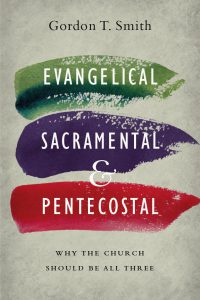Evangelical, Sacramental, and Pentecostal: Why the Church Should be all Three
Gordon T. Smith
InterVarsity
Review by Cherie Bright
What is the subject?
Evangelical churches claim that the church is made of those who read, preach and study the Word; sacramental churches believe that the community’s participation in the sacraments of baptism and the Eucharist are where the church may be found; and Pentecostal churches claim that the church is the gathering of those who have received and are abiding in the Spirit.
Gordon T. Smith argues that the church does not need to choose just one of these focuses, but can and should be all three.
but can and should be all three.
Who is the author?
Gordon T. Smith, president of Ambrose University, Calgary, is an ordained minister with the Christian and Missionary Alliance. Coming from an evangelical background, he draws on his extensive knowledge and experience to challenge the church into places that may be uncomfortable.
Why this book?
A narrow focus can lead to shallow faith. My own faith has been challenged and enriched through conversations with Christians of many traditions, yet the churches I have been connected to all seem to struggle with experiencing this richness.
Excited by Smith’s call for a more robust church life, I believe this book can be a tool for the church to become more of what it is called to be – both through more balanced fellowship practices and through healthier ecumenical cooperation and relationship. It provides a solid starting point for churches.

“This picture is taken on a bench outside Living Word Temple, Winnipeg. I read a good portion of the book there, and it is a place where I have seen boundaries crossed in a way that enriches the whole community (though we still have a long way to go).”—Cherie Bright
Comment on the book’s theological perspective in light of the MB Confession of Faith:
Like Smith’s book, the MB Confession of Faith tries to hold these emphases together. Most churches proceed to emphasize one over the others. The MB Confession starts with Revelation of God: The Written Word of God (Article 2), so it makes sense that this is often emphasized.
Key insight:
Smith’s book shows that the grace of God permeates each ecclesial focus, but when they are combined this grace is seen far more clearly. The grace of God flows into the church through the presence and experience of the Holy Spirit, it is shared and learned through the Word, and it is practiced and embodied through the acts of the community, most visibly, the Eucharist.
Where the book fails:
In picturing a church which lives out all three of these focuses, I can still imagine those who fail to be led into the life-transforming way of discipleship. Although Smith does include life transformation in many of the sections (and tries to emphasize it in the Pentecostal one especially), it seems hidden by this way of framing faith and worship. I think that the transformation of one’s life – allowing, expecting, and asking Christ to do this work – is a vital aspect of worship that needs to be a focus.
Who should read it?
This book is especially important for all who identify under one or even two of these banners because the book opens eyes to see what is missing. It shows that reducing or eliminating one of these points makes faith shapeless, like a triangle missing one corner, squished into a straight line.
This book is for those who want to allow the grace of God to permeate all of their being through the community’s worship.
Favourite quotes:
“First and foremost, each of these is the call of Christ. And we cannot be selective; it is not for us to choose as though we have a menu in front of us.”
“While we do not presume, we do actually anticipate that the Spirit of God would intervene in our broken and fragmented world – in our bodies, in our communities, between peoples, in ways that could only be accredited to the intervention of the Spirit of God.”
[Cherie Bright is a recent graduate of MB Seminary and Canadian Mennonite University, Winnipeg, with an MA in theological studies. She attends Fort Garry MB Church, Winnipeg.
1 comment
Thank you for your review. I am in the midst of reading this book, and am enjoying the call to a more balanced faith. It shares the same spirit as the writings of people like Richard Foster (Streams of Living Waters), and Leane Payne (The Healing Presence) in this regard. I also think a previous MB Herald article is an interesting view on one MB church’s attempt to incorporate liturgical practices into their worship: Anabaptist Liturgical Spirituality and the Supper of Christ (Nov 1, 2010).